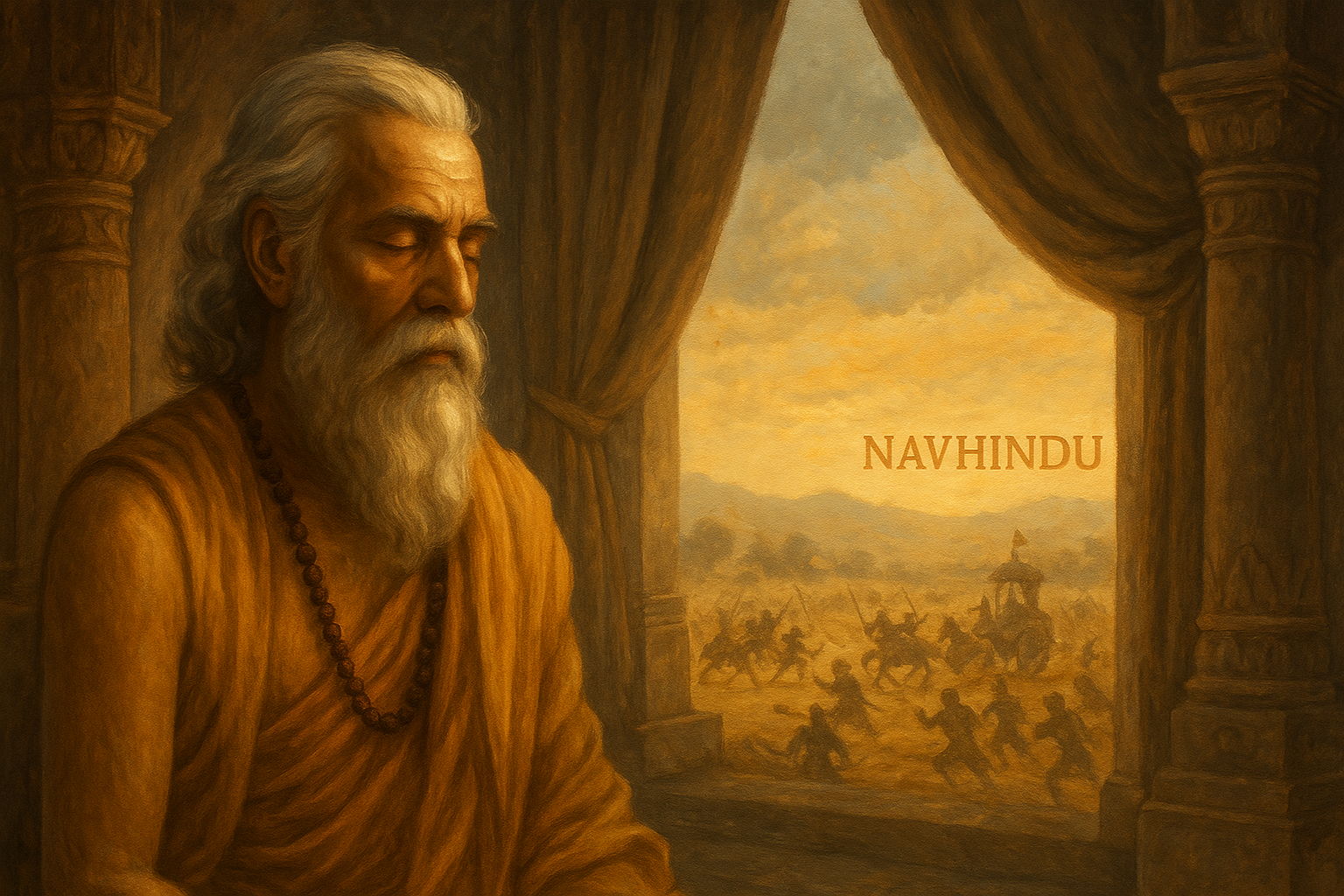The steel of Kurukshetra had stopped singing. Dust from chariot wheels clung to the air, and a silence—thick and uneasy—rested over the great battlefield. Though thousands of warriors clashed under the open sky, far away in the palace of Hastinapura sat a blind king, unable to see the war that would decide the fate of his lineage.
Dhritarashtra was a man who felt everything except vision. He could sense the tremor under the ground. He could hear distant horses breathe. But he could not witness the destiny of his sons through his own eyes. He longed to know—he feared he would be destroyed by knowing.
Between that longing and fear sat Sanjaya.
He was no prince, no renowned scholar, no celebrated hero of the court. Yet in the quiet integrity of his voice, Dhritarashtra found the only window through which he could witness the most consequential conflict in history.
When the war approached, Sage Vyasa had offered Dhritarashtra the gift of divine sight. The king refused. It was not blindness he feared—it was the certainty of watching his sons die. He could not endure that vision.
So Vyasa placed the power instead upon Sanjaya.
One simple palm on the head.
No firecrackers.
No thunder in the clouds.
Just an awakening.
It was not magic.
It was consciousness sharpened into clarity.
Sanjaya suddenly became aware of things beyond ordinary perception. He could see the battlefield without being there. He could listen to the whispers behind the clang of weapons. He could sense the doubt in a warrior’s heartbeat. It was a state of mind where distance surrendered to awareness.
Through this gift, Sanjaya narrated the war day after day—his voice mapping the battlefield across Dhritarashtra’s silent throne room. He described the exact sway of Arjuna’s bow, the dust dancing behind Bhima’s mace, and the unshakable calm in Krishna’s eyes. Dhritarashtra gripped his throne’s armrest, flinching at every arrow that left a bow, sighing at every sword that found its mark.
His imagination bled through Sanjaya’s voice.
No battlefield could have felt louder.
To many, divine vision sounds like supernatural spectacle.
But Mahabharata frames it differently.
It is described as a refinement of:
- mind that does not wander,
- memory that does not fade,
- awareness that does not break.
Such clarity is the backbone of yogic perception.
A mind without the noise of desire or fear can travel further than armies.
Sanjaya possessed that mind.
He did not merely narrate battles; he narrated emotions.
He saw pride swelling in Duryodhana’s chest when Bhishma led the army.
He felt panic ripple through the Kaurava ranks when Arjuna lifted Gandiva.
He sensed Draupadi’s silent endurance and Yudhishthira’s moral conflict.
He saw Kurukshetra not only through sight—but through conscience.
It was through Sanjaya’s vision that we witness the iconic moment when Arjuna lowers his bow in despair before the war even begins. When Krishna reveals the Bhagavad Gita, Sanjaya experiences its echo—a tremor in the very fabric of his awareness, as if the universe itself whispered through him.
In that moment, Dhritarashtra remained still, but Sanjaya breathed differently. He understood that the war had shifted. It had become more than a clash of steel; it became a confrontation of duty and doubt, dharma and delusion.
As the war progressed, Sanjaya’s voice became a thread stitching together two worlds: the chaotic plains of Kurukshetra and the dim hallways of Hastinapura. The king’s body sat far away, but his spirit trembled with every sentence.
Days passed. Warriors fell. Banners burned.
And when Bhishma finally lay pinned by a bed of arrows, Sanjaya’s voice held a rare silence between words—the kind of silence that only arrives when history mourns.
He knew that every narration was not just information—it was transformation.
When the eighteenth day dawned and the final cries faded, Sanjaya returned to stillness. His voice fell quiet not because there was nothing left to say, but because the war had said everything.
Dhritarashtra did not react. He sat without breath or tears. Somewhere, beneath his chest, a truth settled forever: the war he hoped to win had already been lost inside him, years before the first arrow flew.
Sanjaya watched that realization more sharply than he watched the battlefield.
Divine vision is not sight.
It is understanding.
Today, when we speak of far-seeing intelligence, we turn to technology—screens, satellites, drones. We imagine that distance can be conquered by devices.
Mahabharata whispers something subtler:
The deepest distance is between perception and clarity.
A mind untamed can sit in front of truth and never see it.
A mind awakened can sit miles away and grasp everything.
That was Sanjaya’s greatness.
He was not chosen because he had power.
He was chosen because he had stillness.
And so, across centuries, his story stands quietly in the background of a roaring epic—reminding us that the rarest ability is not to see far…
…but to see clearly.
